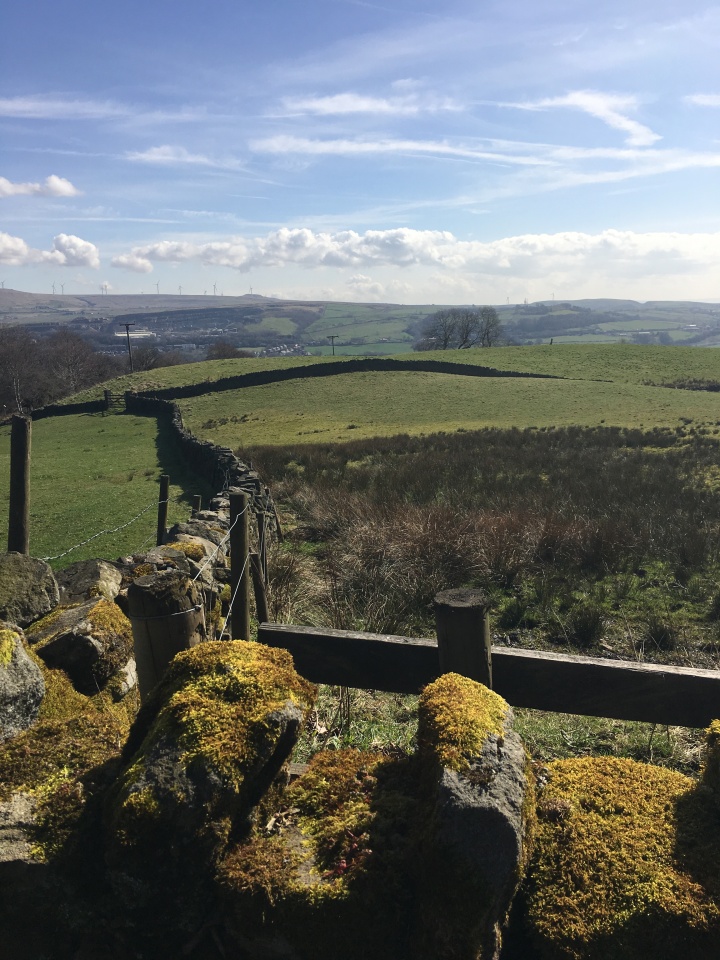
Walking one morning on the Holcombe moors under a bright Spring sun. Distances are vanishing into a gleaming haze and on the banks bloom the first coltsfoot flowers.
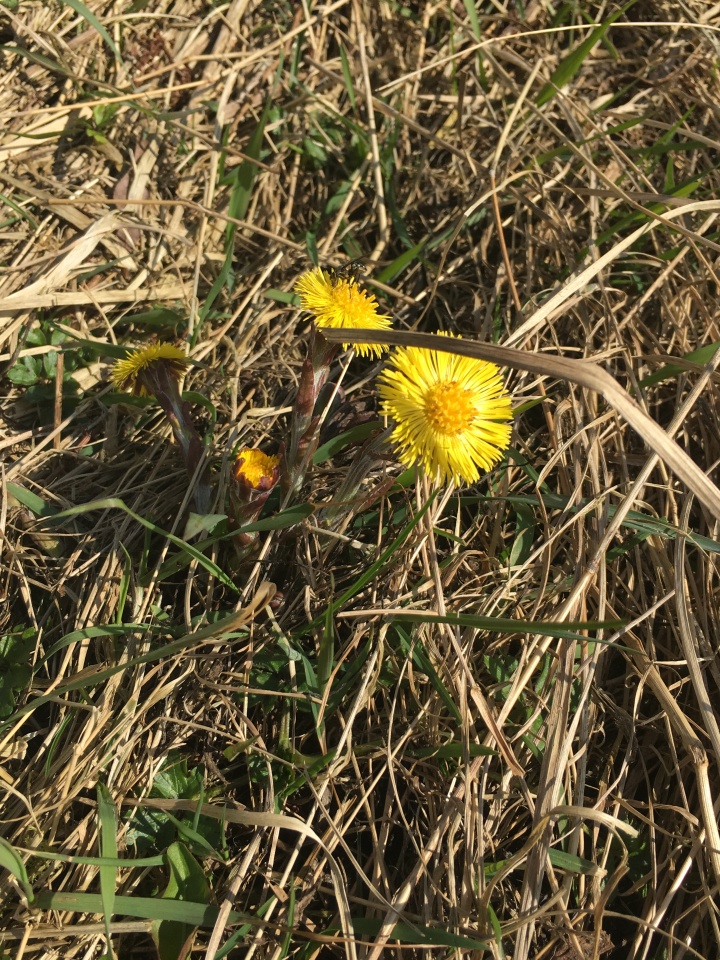
Up Moorbottom lane, the warm stones elicit sensations of Southern Alpine paths.
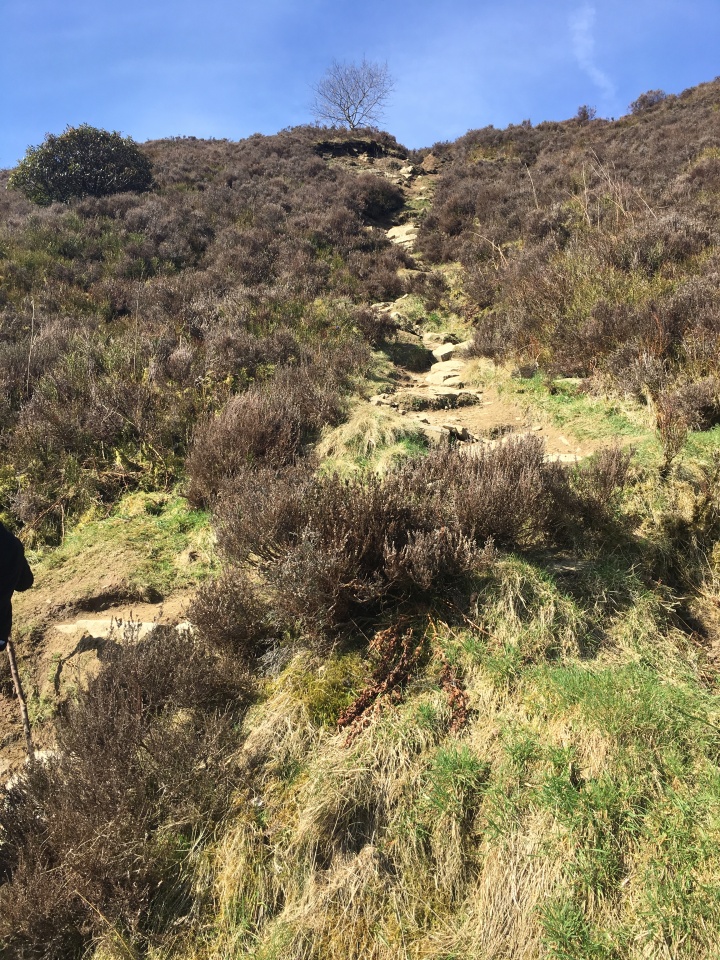
Lancashire moors, Southern Alps, worlds apart ? Not to me. I walk, grateful for the benevolent pressure of gravity, and my whole being is but a smile. The hilltop is a sea of blond manes, vibrating with the skylarks’ song, and we ride to the frontier whence the clouds rise.
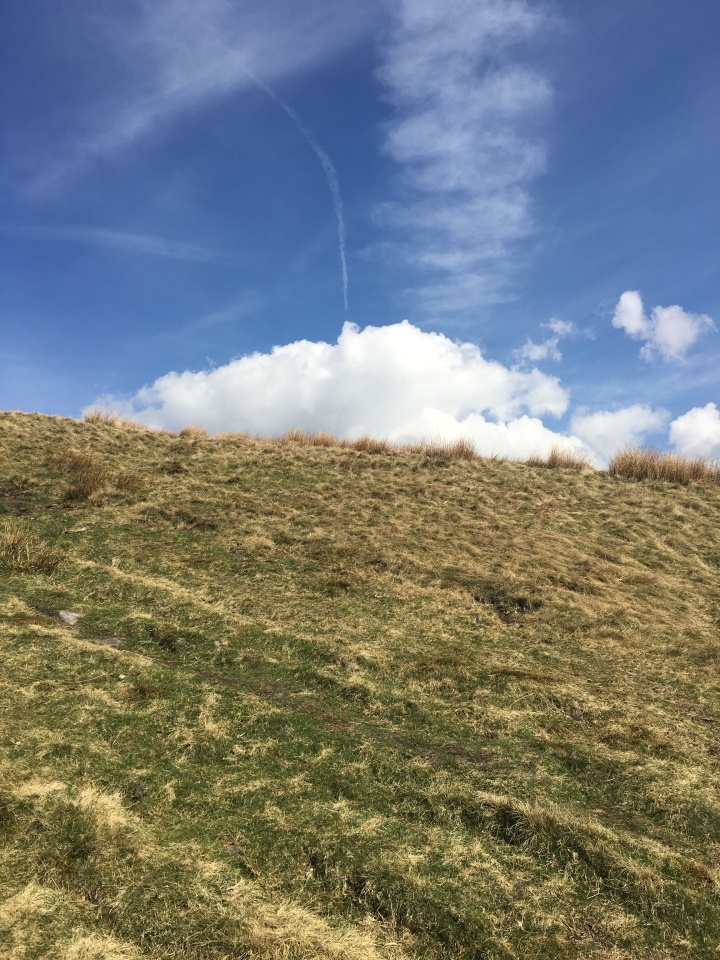
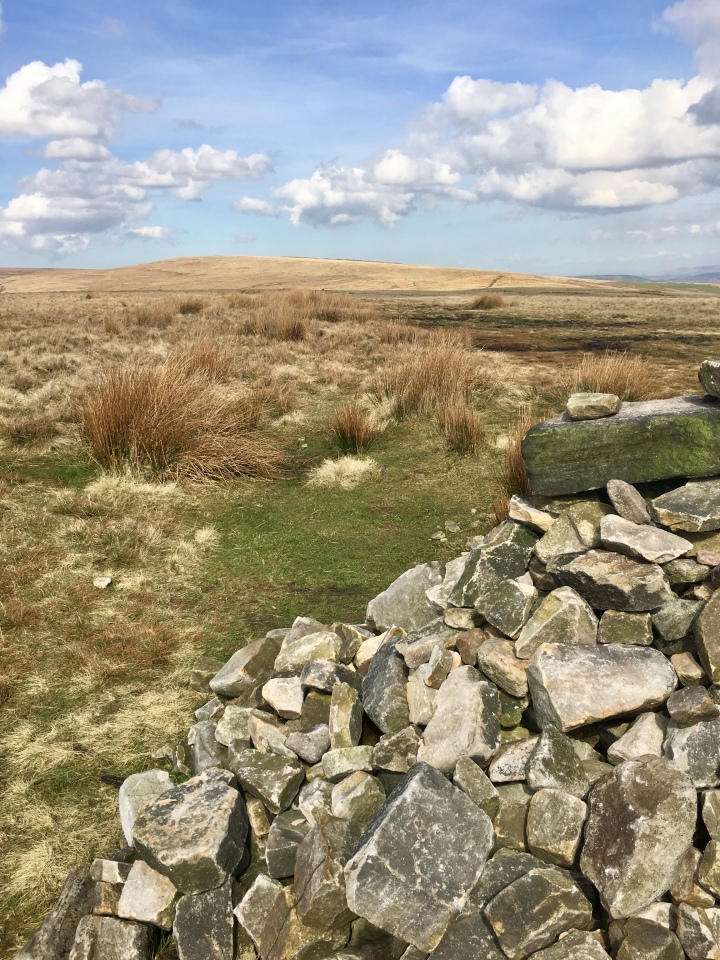
For the skylarks I am immensely grateful. I love The Lark Ascending, but have never actually seen one, let alone a hill full of them. I follow many as they aim to pierce heavens, and fall. At one point, I see one disappear into the blue, as I was told they do, sometimes, mysteriously. I stand transfixed under the empty sky where its song still resonates. Then comes a familiar pull, inside, a need to put words on this happiness.
This is L’s home, the hills of his childhood. At their foot lies his hometown. It is a small Northern ex-industrial settlement which, at first sight, any visitor would find dreary, to say the least. I still wonder how his first girlfriend, a girl expelled from the Tuscan paradise of Arezzo, survived the aesthetic (as well as climatic and cultural) shock. As for him, who had no other home to escape to, he found salvation through an interest in local history. Researching the archives to write the story of his region and try to salvage the remnants of the Industrial Revolution heritage from the shortsightedness of local councils infinitely broadened the possibilities of what first seemed to be on offer. On those soot-dark mill town walls, a wealth of echoes started to resonate, windows opened onto a richly animated world. Under its veil of rain, the landscape began whispering, speaking, singing. History wasn’t that merely useful source of valuable lessons it is so often sold as, but a meeting place and a condition of happiness. In L’s case, there was a deliberate attempt to draw from the powers of memory (his own and that of others) in order to defeat the poverty of his experience. For me too, happiness and memory are intrinsically intertwined, but in a different way.
My mind’s memory is very poor, and not improving. Of concepts and ideas I find myself quite deprived. Of cultural references – facts, dates, names, stories, those bricks needed to build a decent system of thoughts –, I have to admit to being less endowed than any person of a similar level of education should be. Why, I can’t even remember events in my own life, and those I can recall, I am often unable to order chronologically, even approximately. Yet it is memory that heals me and makes me happy. I hesitate to use the word “heal”, as I can’t pretend to have ever been torn apart by any particular event – but I was born and long lived under the star of an intense and unfathomable sadness.
Early in my life – before the age of ten – I waged war against time, in which my youth could only see a dispossessing monster, by trying to remember everything. That such a doomed pursuit could only lead to deeper sadness didn’t stop me from trying with all I had. It may have developed my writing skills but it was exhausting. It was bitter. On the edge of adulthood, stubborn though I was, I simply had to let go. Having yielded to the healthy necessity to forget, I survived. Yet, memory undoubtedly is at the heart of any happiness I experience now. Not the overburdened and then discarded storage system of my childhood, but a different form of memory. One through which, though unable to summon facts and dates, I experience what I would tentatively describe as volume, depth and thickness of sensation. A perception of complexity rooted less in the mind than in the body.
The frontier between the physical world – reality, as some would call it – and its spiritual body, is fading. There are layers in the light and layers in the present. I can perceive them. It is nothing new, but time, and gardening, have sharpened my consciousness of it, and extended the depth to which I can perceive. I can feel the continuous presence of what a restricted linear conception of time would have us believe are different instances, all of which supposedly dead but one, which is fleeting, and now gone. Oh, but things remain ! To describe that, French words come to me: concomitance, rémanence.
No effort of the mind is required. It is simply there: the radiance of a form of consciousness which appears in the likeness of a physical sensation, for it is rooted in the body and its memory. And so, years passing, I find myself increasingly relying on unconscious or barely conscious movements seated in my flesh to feel, of course, but also learn, remember, write. All that might not deserve to be called “thinking”, but it makes me happier. More learned people might say I am merely trying to describe something which psychoanalysts and explorers of the subconscious are familiar with. To me, it is a spiritual experience.
The feeling of incompleteness, of hollowness, we are told, is a distinctive part of the human condition. With conscience comes the sharp bite of loneliness. Yet… Try to walk in life as you would up a sunny mountain side, opening your senses, widening your conscience, sharpening your awareness: more is present than first appears. Feel how the densified air holds and defines your body, your mood, through pleasure and pain, how manifold the world, how it embraces you, abrades you, how its manifestations become signs, and marvel at your soul revealed. Is there really such a thing as loneliness ? It is love I feel. And if I get the chance to answer to its call, to share a few words, even to the passing wind, then this life is worthwhile indeed.
*
Behold
On the hilltops, skylarks
Shrill as light’s beating heart
Shooting up in the blue
Till all is song
*
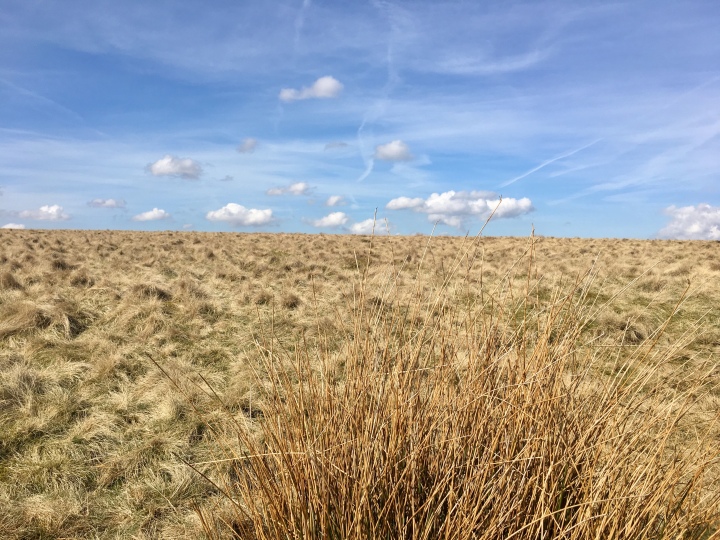
Superb! Your English is just fine! – Douglas 🙂
LikeLiked by 1 person
Beautiful photographs. What inspirational scenery!
LikeLiked by 1 person
Thank you Carolee ! Yes, we were very lucky to get that one day of warm sun. 🙂
LikeLike
Je “sais” ce dont tu parles, cette mémoire qui n’en est pas vraiment une, cette perception élargie du temps et de l’espace…tout en l’expérimentant un peu différemment. En te lisant, tout était lumineux 🙂 Souvent, j’imagine que nous aurions des conversations sans fin dans la vraie vie ^^
LikeLiked by 1 person
En écrivant ce texte, j’ai pensé à toi, qui te penche aussi sur la mémoire du corps. 😊
LikeLiked by 1 person
Penches, c’est mieux. 😉
LikeLike
Exactement ! Il y a tant de résonances dans ce que tu dis avec ce que j’ai essayé de faire passer dans mon dernier billet… mais je crois que c’est une expérience tellement particulière qu’elle ne peut pleinement être comprise que par ceux qui la vivent dans l’intime de leur corps. L’épigénétique devrait te passionner, qui va beaucoup plus loin que ce que dit la psychanalyse de l’inconscient… 🙂
LikeLiked by 1 person
Ah, d’accord ! J’avoue ne rien y connaître. Mais est ce que la psychanalyse et l’épigénétique oeuvrent sur le même matériau /domaine ?
LikeLiked by 1 person
Je n’y connaissais rien il y a peu 🙂 Et je n’en sais encore pas beaucoup ^^ Les deux disciplines n’œuvrent pas du tout sur le même domaine, mais elles s’interrogent toutes deux sur les modes de transmission d’un “patrimoine” humain. En ce qui concerne l’épigénétique, le travail se fait sur les interactions entre l’environnement, la cellule , la structure de l’ADN…. Là où la psychanalyse comme tu le sais travaille en revanche sur le cerveau, la conscience et l’inconscient pour éclairer ce patrimoine. Mais aucune des deux disciplines n’est encore capable à ma connaissance d’expliquer pleinement ce dont tu/je parles, à savoir comment se transmet la mémoire d’un savoir, et surtout d’une perception qui déborde le temps et l’espace. Il me semblerait pourtant passionnant de se demander comment/et où on peut hériter génétiquement de cette perception dans le corps, au même titre qu’un caractère génétique comme les yeux bleus, verts etc… Et tout autant comment notre cerveau humain hérite de savoirs qu’on n’a jamais appris ( mon fils qui à 4 ans, sans avoir appris à lire et à peine à écrire transcrivait orthographiquement sans aucune faute des mots qu’il ne connaissait pas, comme chrysalide ^^, et qui depuis, ne fait jamais de faute d’orthographe, en français comme dans les 3 langues étrangères qu’il parle …)
LikeLiked by 1 person
Oh la la, ton fils parle 4 langues ! C’est vraiment remarquable ! (Smiley aux yeux écarquillés)
LikeLiked by 1 person
Tu sais, il y a plein d’enfants qui en font autant aujourd’hui, notamment avec les sections européennes. C’est devenu plus courant. En revanche, c’est plutôt la manière dont il n’apprend pas qui m’étonne : comme si une fois qu’il avait quelques clés, cela lui permettait de déverrouiller un contenu qu’il restitue sans fautes, avec une précision extrême dans les données, même très compliquées. J’ai souvent l’impression qu’il va chercher dans une sorte de disque “dur” dans son cerveau… 🙂
LikeLiked by 1 person
Mon fils est aussi un peu comme ca ! Mais en moins exceptionnel. C’est drôle ! 🙂
LikeLiked by 1 person
Exceptionnel, je ne sais pas, sauf si on prend l’adjectif au sens de faire exception, sans superlatif ^^. Le mien est autiste Asperger, ceci explique sans doute son fonctionnement un peu « hors normes ».
LikeLiked by 1 person
Oui c’est ce que je voulais dire. Mon fils a aussi été placé dans le spectre de l’autisme.
LikeLiked by 1 person
Spectre qui réserve des surprises dans le champ de la perception et de la sensation 😉
LikeLiked by 1 person
C’est vrai ! Mon fils associe des couleurs aux lettres mais il dit que c’est peut-être à cause du puzzle sur lequel il a appris l’alphabet.
LikeLiked by 1 person
Synesthésie … 🙂 phénomène très courant dans ce spectre. Le mien associe des matières aux sons 😉
LikeLiked by 1 person
Reblogged this on From 1 Blogger 2 Another.
LikeLiked by 1 person
Hello Douglas ! Thank you very much for the reblog ! 😊
LikeLike
My pleasure!
LikeLiked by 1 person
For Kentish skylarks, try the open country between Adisham/Aylesham and Thanet. And their relative, the rock pipits, used to live at Ramsgate harbour. You take me back to an Irish roadside, where a hen skylark played her broken wing act: as though I would have hurt her chicks!
LikeLiked by 1 person
Thank you for the advice ! I will keep in mind ! 🙂
LikeLike